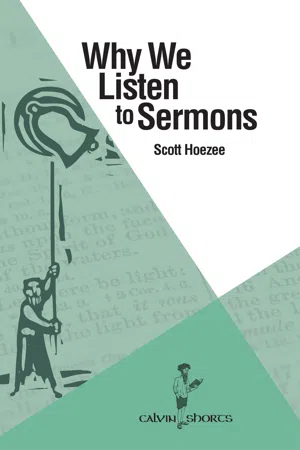![]()
Life is full of rituals, routines, and predictable patterns. If you go to the movies, you know that you will sit through a good many previews of coming attractions before you get to the movie you came to see. If you go to a baseball game, there is the seventh inning stretch when everyone stands and sings a song in the middle of an inning fairly late in the game. And if you attend a church service, you will sing hymns and hear a sermon. When you are well accustomed to these rituals and traditions, you rarely question them. But once in a while, it can be useful to step back and wonder why we do the things we do.
The great preacher and theologian Jonathan Edwards did that once. He took a step back from all that was familiar about worship in the church to ask why. Why do we sing our faith? Why not just speak it? Why do we have sermons based on the Bible? Why not just read Scripture instead of having someone talk about it? These are very fine questions.
After all, Christians believe the Bible is like no other book in history. Christians confess that all of Scripture is “God-breathed,” or inspired, as Paul once wrote to Timothy (2 Timothy 3:16). Although God used human authors and their various skills, the thoughts they conveyed were finally God’s own thoughts. The resulting book is confessed by orthodox believers as infallible, as wholly reliable in all things it intends to teach. The truth about humanity, sin, our need for a Savior, and God’s redemptive plan are all in the Bible. It is an amazing book. It is a holy book.
So why not just spend our time reading it? Why don’t we establish reading rooms like the Christian Science religion but in our case go to such places to read and reread and read again only the Bible? Even when we gather for worship, why not just have endless recitations of Scripture? If everything we need to know is in there, why do we clutter up worship with human words about the Bible in the form of sermons? Aren’t the words of the preacher vastly secondary to the Bible anyway? Could those human words actually get in the way of the Bible’s own words?
Again, these are good questions we may not often ask or ponder. But since this is a book about preaching, we want to wonder about such questions. What’s more, we will wonder about them from the perspective of those who listen to sermons. Although I hope my fellow preachers will read and appreciate this book, my main goal is to help all those who attend church to become better listeners. Why do we listen to sermons in the first place? For what should we be listening? If we ever were asked formally to evaluate a sermon, what categories are appropriate to use in such critiques? These are the kinds of questions we will wonder about.
FROM THE BEGINNING
As we begin, we can note an obvious fact of history: ever since the founding of the church on the day of Pentecost, preaching has been a standard part of almost all Christian worship services. (Actually, and as we will see in the next chapter, some sense of preaching is present throughout the entire Bible.) Traditions may vary on the nature or length of a sermon, but throughout two thousand years of church history, we cannot find an era when preaching did not exist.
What’s more, if Pentecost itself is any indication, it would seem that the Holy Spirit has long chosen preaching as the Spirit’s primary way to get the gospel across to the world, because once that Spirit was poured out on the apostles, the very first thing that happened was that the apostle Peter preached a significant sermon. That sermon is the first of more than two dozen sermons that form the backbone of the Book of Acts. Preaching, it seems, has been with the church since the get-go. It is how the Spirit works. As Paul wrote in Romans 10, people cannot believe in a Savior they have never heard about. But then, “How can they hear without someone preaching to them?” (v. 14b).
But why preaching? Granted, in the earliest days of the church, copies of the Bible were rare. Certainly, no one owned a personal copy as people do today. Just reading the Bible, therefore, was not an option for most. Still, others could have read Scripture in worship while everyone else just listened. But no, there have always been sermons based on the Bible.
What does the sermon add to worship services that mere recitations of the Bible might not accomplish? A first thing to notice is this: the Bible’s role as the foundation and root of the sermon has always been paramount. If a given sermon is not clearly bound up with a given text from Scripture, most judge it to be less of a sermon and more of a speech or a lecture. In most church traditions, those who wish to become pastors need to demonstrate clearly that they know how to craft sermons that are deeply rooted in the Bible alone.
Precisely because the Bible is God’s own revelation, no one can hear reliably from God in a sermon if that message does not stem straight from Scripture. In short, sermons do not hide or obscure Scripture but showcase it. (So if you attend a church where more weeks than not you wonder, “What did that sermon have to do with the Bible?” then you have cause to be a bit worried as to what your pastor is up to. We will talk about how to evaluate sermons, including whether or not they count as biblical, in chapter 3.)
Sermons showcase Scripture. Again, though, what do sermons accomplish that just reading the text would not? Simply put, the fact that the Spirit has always used sermons is itself a way to honor the Bible. Precisely because the Bible is God’s own holy Word, we rightly assume it is deep and rich. Yes, we can learn a lot just reading the Bible. On one level, the Bible is simple, clear. But on another level, the Bible contains mysteries and truths so mind-boggling that we will never finish exhausting its riches. It has been said that the Bible is like a body of water. In one sense, it is shallow enough that a toddler can splash around safely in it. But in another sense, this body of water is so deep that an elephant could easily drown in it. The message of Scripture is so plain and simple that many have come to faith just by reading the Gospel of Mark. But that same message is so wonderfully dense that many lifetimes would not be enough to plumb all the depths of even just Mark’s Gospel.
The sermon exists somewhere in between those two poles. All preachers should hope that the simple message of Jesus and his love comes through every sermon. It is said that the great German theologian Karl Barth was once asked what he thought is the summation of all theology. Barth had written thousands of pages in his multivolume magnum opus The Church Dogmatics. But in answer to that question, he replied simply, “Jesus loves me this I know, for the Bible tells me so.” Preaching begins there too.
But preaching also looks to those great mysteries and depths of the Bible. There is much the average person—and the average preacher!—is not going to grasp on a first or a quick reading. Sermons seek to extend into those depths in order to strengthen and deepen the faith of those who listen to them. But not just faith in the sense of knowledge. Sermons also deepen people’s faith in the sense of having proper awe of God and his works.
GROWING UP
One of the first heresies the early church had to deal with was called Gnosticism. This school of thought has many features, but a key idea in Gnosticism is that we are saved in large part by knowledge, by what we know, by gaining access to secret information. The church has long rejected this idea. We are saved by grace alone. We are saved by God’s love in Jesus Christ. This does not mean, however, that what we know as Christians is unimportant. The Bible seems to assume that true believers both will want to expand their grasp of God’s Word and will in fact do so as time goes on.
The apostle Paul talked about this several times in his first letter to the quarrelsome believers in Corinth. He often had to note that they were still like infants or little children in the faith. But even as Paul noted this, he also pointed to the goal of greater understanding. “Brothers and sisters, I could not address you as people who live by the Spirit but as people who are still worldly—mere infants in Christ. I gave you milk, not solid food, for you were not yet ready for it. Indeed, you are still not ready” (1 Corinthians 3:1–2). But Paul’s point is that they should be getting ready to handle more than just milk.
Paul sounds a similar theme when writing to the Christians in Ephesus. “So Christ himself gave the apostles, the prophets, the evangelists, the pastors and teachers, to equip his people for works of service, so that the body of Christ may be built up until we all reach unity in the faith and in the knowledge of the Son of God and become mature, attaining to the whole measure of the fullness of Christ. Then we will no longer be infants, tossed back and forth by the waves, and blown here and there by every wind of teaching and by the cunning and craftiness of people in their deceitful scheming. Instead, speaking the truth in love, we will grow to become in every respect the mature body of him who is the head, that is, Christ” (Ephesians 4:11–15). Clearly, Paul saw the need for all of us to grow up, to mature in our discipleship and our understanding of Christ.
Most people in the church are not biblical scholars. They are not professional theologians. All people vary a bit in terms of their intellectual prowess, and no one has ever said that a person is a better Christian if he or she is just generally a smarter person. Still, growth in the knowledge of God is expected in the Bible and in the church. Sermons seek to assist in this process of maturity. At heart, every sermon should seek to proclaim the Good News (as we will think about in chapter 4). The simple but glorious messages of “Jesus saves!” and “The kingdom of God is at hand!” should never be far from the heartbeat of every sermon preached.
But then sermons go beyond those simple declarations too. Sermons provide spiritual milk for those who still need it but also spiritual meat for those ready for more adult fare. Sermons explain those passages that seem difficult in the Bible. But sermons also reveal the hidden depths of texts that seem simple but that connect to God’s grander story in ways we might miss without the guidance of a good teacher.
A good sermon on the Samaritan woman at the well in John 4, for instance, will point out that when the woman says, “I know that Messiah is coming,” Jesus replies (in the Greek of the text) by saying si...

